Abstract
1. Diadenosine tetraphosphate (Ap4A) a dinucleotide, which is stored in secretory granules, presents two types of high affinity binding sites in chromaffin cells. A Kd value of 8 +/- 0.65 x 10(-11) M and Bmax value of 5420 +/- 450 sites per cell were obtained for the high affinity binding site. A Kd value of 5.6 +/- 0.53 x 10(-9) M and a Bmax value close to 70,000 sites per cell were obtained for the second binding site with high affinity. 2. The diadenosine polyphosphates, Ap3A, Ap4A, Ap5A and Ap6A, displaced [3H]-Ap4A from the two binding sites, the Ki values being 1.0 nM, 0.013 nM, 0.013 nM and 0.013 nM for the very high affinity binding site and 0.5 microM, 0.13 microM, 0.062 microM and 0.75 microM for the second binding site. 3. The ATP analogues displaced [3H]-Ap4A with the potency order of the P2y receptors, adenosine 5'-O-(2 thiodiphosphate) (ADP-beta-S) greater than 5'-adenylyl imidodiphosphate (AMP-PNP) greater than alpha, beta-methylene ATP (alpha, beta-MeATP), in both binding sites. The Ki values were respectively 0.075 nM, 0.2 nM and 0.75 nM for the very high affinity binding site and 0.125 microM, 0.5 microM and 0.9 microM for the second binding site.
Full text
PDF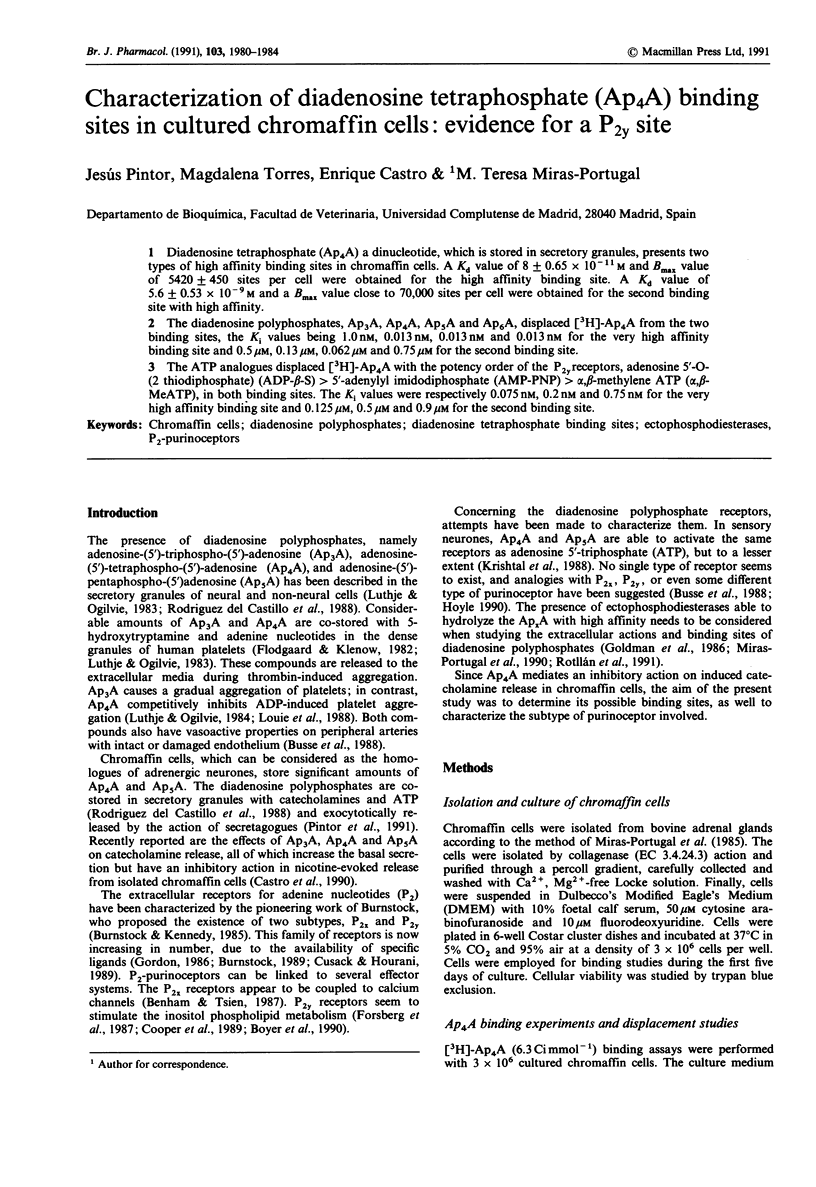
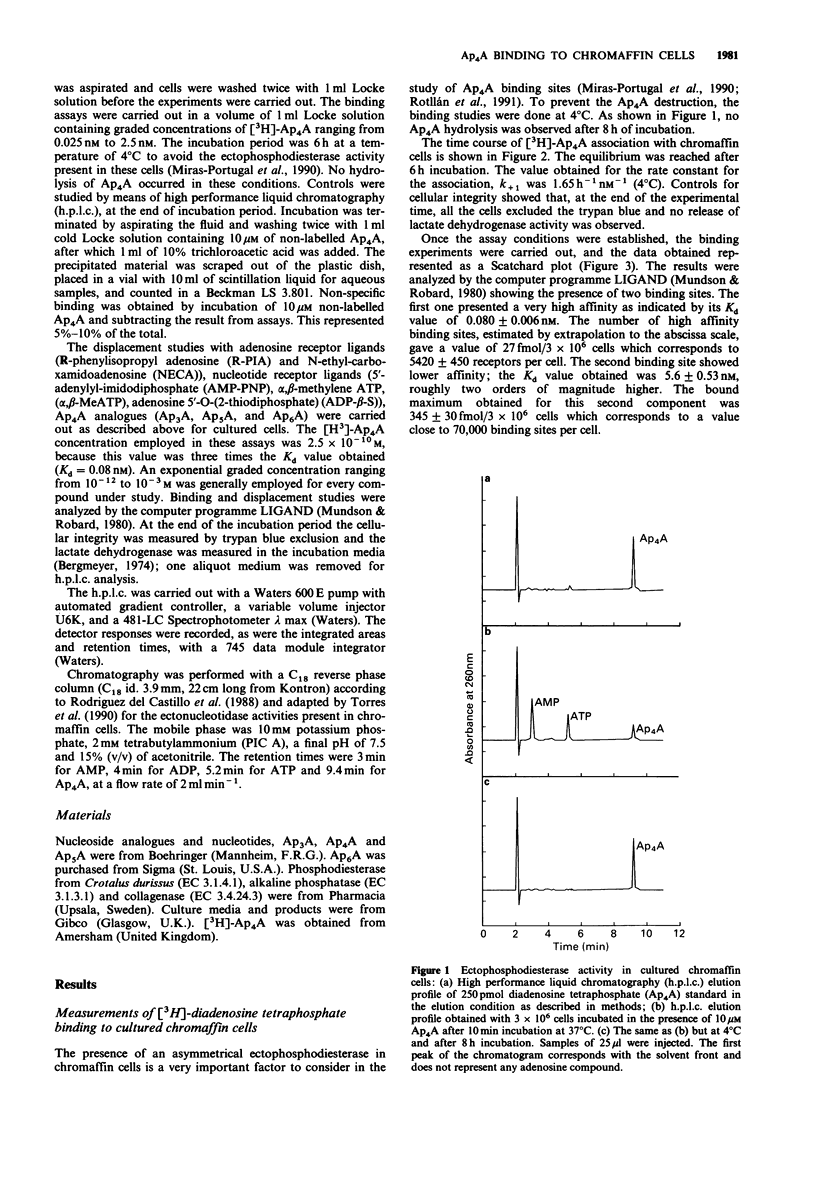
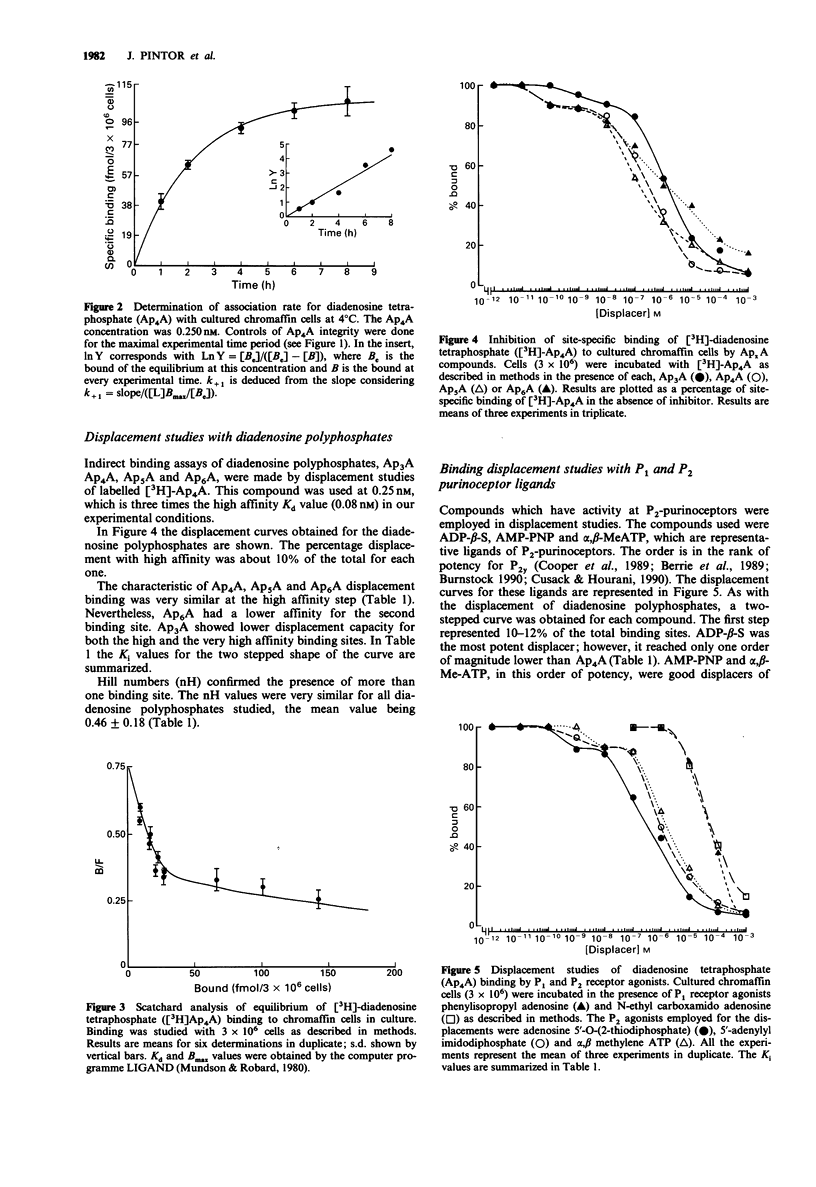
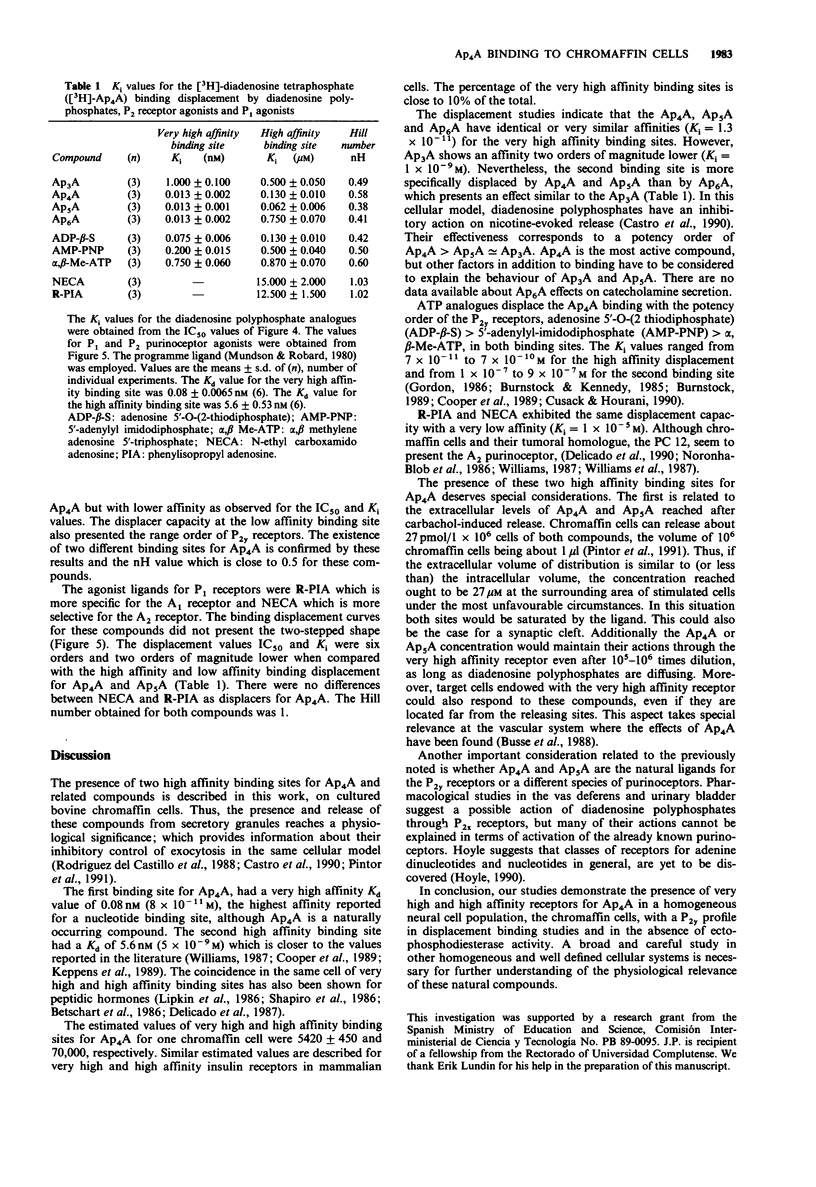
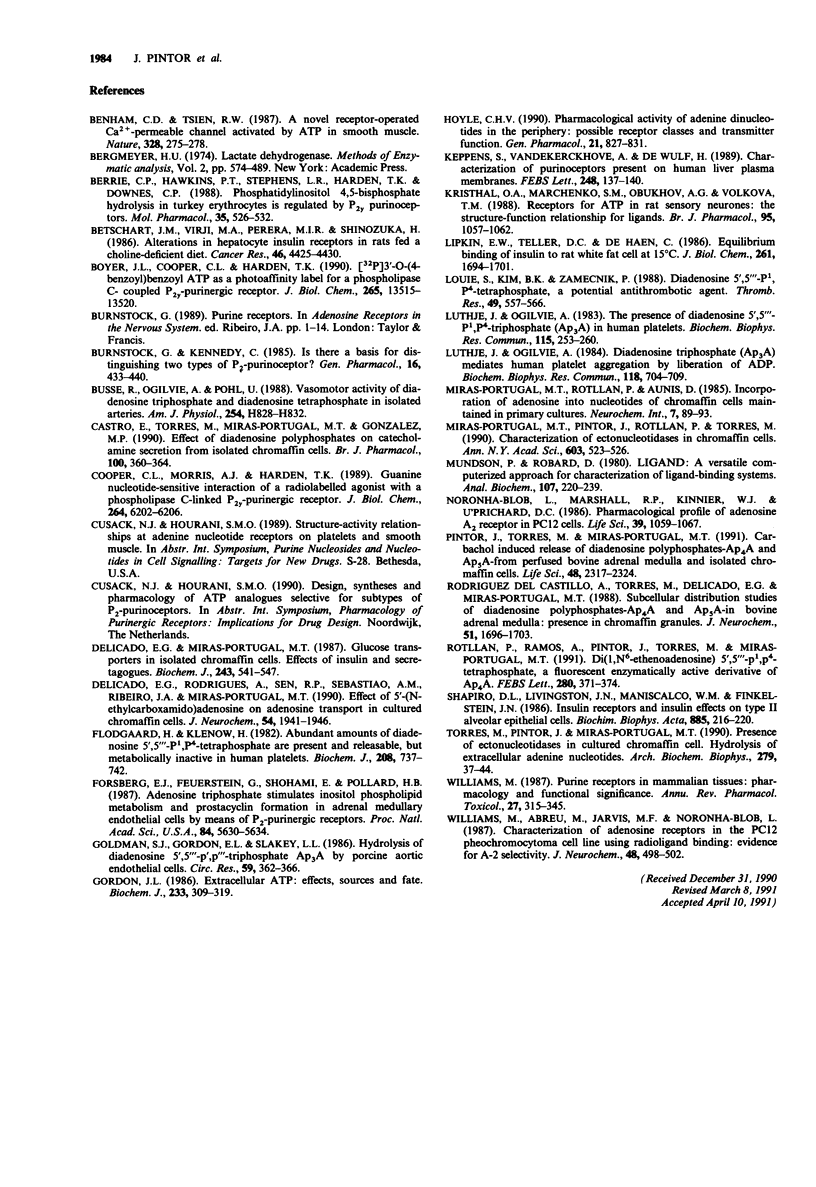
Selected References
These references are in PubMed. This may not be the complete list of references from this article.
- Benham C. D., Tsien R. W. A novel receptor-operated Ca2+-permeable channel activated by ATP in smooth muscle. Nature. 1987 Jul 16;328(6127):275–278. doi: 10.1038/328275a0. [DOI] [PubMed] [Google Scholar]
- Berrie C. P., Hawkins P. T., Stephens L. R., Harden T. K., Downes C. P. Phosphatidylinositol 4,5-bisphosphate hydrolysis in turkey erythrocytes is regulated by P2y purinoceptors. Mol Pharmacol. 1989 Apr;35(4):526–532. [PubMed] [Google Scholar]
- Betschart J. M., Virji M. A., Perera M. I., Shinozuka H. Alterations in hepatocyte insulin receptors in rats fed a choline-deficient diet. Cancer Res. 1986 Sep;46(9):4425–4430. [PubMed] [Google Scholar]
- Boyer J. L., Cooper C. L., Harden T. K. [32P]3'-O-(4-benzoyl)benzoyl ATP as a photoaffinity label for a phospholipase C-coupled P2Y-purinergic receptor. J Biol Chem. 1990 Aug 15;265(23):13515–13520. [PubMed] [Google Scholar]
- Burnstock G., Kennedy C. Is there a basis for distinguishing two types of P2-purinoceptor? Gen Pharmacol. 1985;16(5):433–440. doi: 10.1016/0306-3623(85)90001-1. [DOI] [PubMed] [Google Scholar]
- Busse R., Ogilvie A., Pohl U. Vasomotor activity of diadenosine triphosphate and diadenosine tetraphosphate in isolated arteries. Am J Physiol. 1988 May;254(5 Pt 2):H828–H832. doi: 10.1152/ajpheart.1988.254.5.H828. [DOI] [PubMed] [Google Scholar]
- Castro E., Torres M., Miras-Portugal M. T., Gonzalez M. P. Effect of diadenosine polyphosphates on catecholamine secretion from isolated chromaffin cells. Br J Pharmacol. 1990 Jun;100(2):360–364. doi: 10.1111/j.1476-5381.1990.tb15809.x. [DOI] [PMC free article] [PubMed] [Google Scholar]
- Cooper C. L., Morris A. J., Harden T. K. Guanine nucleotide-sensitive interaction of a radiolabeled agonist with a phospholipase C-linked P2y-purinergic receptor. J Biol Chem. 1989 Apr 15;264(11):6202–6206. [PubMed] [Google Scholar]
- Delicado E. G., Miras Portugal M. T. Glucose transporters in isolated chromaffin cells. Effects of insulin and secretagogues. Biochem J. 1987 Apr 15;243(2):541–547. doi: 10.1042/bj2430541. [DOI] [PMC free article] [PubMed] [Google Scholar]
- Delicado E. G., Rodrigues A., Sen R. P., Sebastiao A. M., Ribeiro J. A., Miras-Portugal M. T. Effect of 5'-(N-ethylcarboxamido)adenosine on adenosine transport in cultured chromaffin cells. J Neurochem. 1990 Jun;54(6):1941–1946. doi: 10.1111/j.1471-4159.1990.tb04895.x. [DOI] [PubMed] [Google Scholar]
- Flodgaard H., Klenow H. Abundant amounts of diadenosine 5',5"'-P1,P4-tetraphosphate are present and releasable, but metabolically inactive, in human platelets. Biochem J. 1982 Dec 15;208(3):737–742. doi: 10.1042/bj2080737. [DOI] [PMC free article] [PubMed] [Google Scholar]
- Forsberg E. J., Feuerstein G., Shohami E., Pollard H. B. Adenosine triphosphate stimulates inositol phospholipid metabolism and prostacyclin formation in adrenal medullary endothelial cells by means of P2-purinergic receptors. Proc Natl Acad Sci U S A. 1987 Aug;84(16):5630–5634. doi: 10.1073/pnas.84.16.5630. [DOI] [PMC free article] [PubMed] [Google Scholar]
- Goldman S. J., Gordon E. L., Slakey L. L. Hydrolysis of diadenosine 5',5''-P',P''-triphosphate (Ap3A) by porcine aortic endothelial cells. Circ Res. 1986 Sep;59(3):362–366. doi: 10.1161/01.res.59.3.362. [DOI] [PubMed] [Google Scholar]
- Gordon J. L. Extracellular ATP: effects, sources and fate. Biochem J. 1986 Jan 15;233(2):309–319. doi: 10.1042/bj2330309. [DOI] [PMC free article] [PubMed] [Google Scholar]
- Hoyle C. H. Pharmacological activity of adenine dinucleotides in the periphery: possible receptor classes and transmitter function. Gen Pharmacol. 1990;21(6):827–831. doi: 10.1016/0306-3623(90)90440-w. [DOI] [PubMed] [Google Scholar]
- Keppens S., Vandekerckhove A., De Wulf H. Characterization of purinoceptors present on human liver plasma membranes. FEBS Lett. 1989 May 8;248(1-2):137–140. doi: 10.1016/0014-5793(89)80448-x. [DOI] [PubMed] [Google Scholar]
- Krishtal O. A., Marchenko S. M., Obukhov A. G., Volkova T. M. Receptors for ATP in rat sensory neurones: the structure-function relationship for ligands. Br J Pharmacol. 1988 Dec;95(4):1057–1062. doi: 10.1111/j.1476-5381.1988.tb11739.x. [DOI] [PMC free article] [PubMed] [Google Scholar]
- Lipkin E. W., Teller D. C., de Haën C. Equilibrium binding of insulin to rat white fat cells at 15 degrees C. J Biol Chem. 1986 Feb 5;261(4):1694–1701. [PubMed] [Google Scholar]
- Louie S., Kim B. K., Zamecnik P. Diadenosine 5',5'''-P1,P4-tetraphosphate, a potential antithrombotic agent. Thromb Res. 1988 Mar 15;49(6):557–565. doi: 10.1016/0049-3848(88)90253-8. [DOI] [PubMed] [Google Scholar]
- Lüthje J., Ogilvie A. Diadenosine triphosphate (Ap3A) mediates human platelet aggregation by liberation of ADP. Biochem Biophys Res Commun. 1984 Feb 14;118(3):704–709. doi: 10.1016/0006-291x(84)91451-7. [DOI] [PubMed] [Google Scholar]
- Lüthje J., Ogilvie A. The presence of diadenosine 5',5'''-P1,P3-triphosphate (Ap3A) in human platelets. Biochem Biophys Res Commun. 1983 Aug 30;115(1):253–260. doi: 10.1016/0006-291x(83)90997-x. [DOI] [PubMed] [Google Scholar]
- Munson P. J., Rodbard D. Ligand: a versatile computerized approach for characterization of ligand-binding systems. Anal Biochem. 1980 Sep 1;107(1):220–239. doi: 10.1016/0003-2697(80)90515-1. [DOI] [PubMed] [Google Scholar]
- Noronha-Blob L., Marshall R. P., Kinnier W. J., U'Prichard D. C. Pharmacological profile of adenosine A2 receptor in PC12 cells. Life Sci. 1986 Sep 22;39(12):1059–1067. doi: 10.1016/0024-3205(86)90197-9. [DOI] [PubMed] [Google Scholar]
- Pintor J., Torres M., Miras-Portugal M. T. Carbachol induced release of diadenosine polyphosphates--Ap4A and Ap5A--from perfused bovine adrenal medulla and isolated chromaffin cells. Life Sci. 1991;48(24):2317–2324. doi: 10.1016/0024-3205(91)90268-g. [DOI] [PubMed] [Google Scholar]
- Rodriguez del Castillo A., Torres M., Delicado E. G., Miras-Portugal M. T. Subcellular distribution studies of diadenosine polyphosphates--Ap4A and Ap5A--in bovine adrenal medulla: presence in chromaffin granules. J Neurochem. 1988 Dec;51(6):1696–1703. doi: 10.1111/j.1471-4159.1988.tb01147.x. [DOI] [PubMed] [Google Scholar]
- Rotilán P., Ramos A., Pintor J., Torres M., Miras-Portugal M. T. Di(1,N6-ethenoadenosine)5', 5'''-P1,P4-tetraphosphate, a fluorescent enzymatically active derivative of Ap4A. FEBS Lett. 1991 Mar 25;280(2):371–374. doi: 10.1016/0014-5793(91)80334-y. [DOI] [PubMed] [Google Scholar]
- Shapiro D. L., Livingston J. N., Maniscalco W. M., Finkelstein J. N. Insulin receptors and insulin effects on type II alveolar epithelial cells. Biochim Biophys Acta. 1986 Feb 21;885(2):216–220. doi: 10.1016/0167-4889(86)90091-1. [DOI] [PubMed] [Google Scholar]
- Williams M., Abreu M., Jarvis M. F., Noronha-Blob L. Characterization of adenosine receptors in the PC12 pheochromocytoma cell line using radioligand binding: evidence for A-2 selectivity. J Neurochem. 1987 Feb;48(2):498–502. doi: 10.1111/j.1471-4159.1987.tb04120.x. [DOI] [PubMed] [Google Scholar]
- Williams M. Purine receptors in mammalian tissues: pharmacology and functional significance. Annu Rev Pharmacol Toxicol. 1987;27:315–345. doi: 10.1146/annurev.pa.27.040187.001531. [DOI] [PubMed] [Google Scholar]


